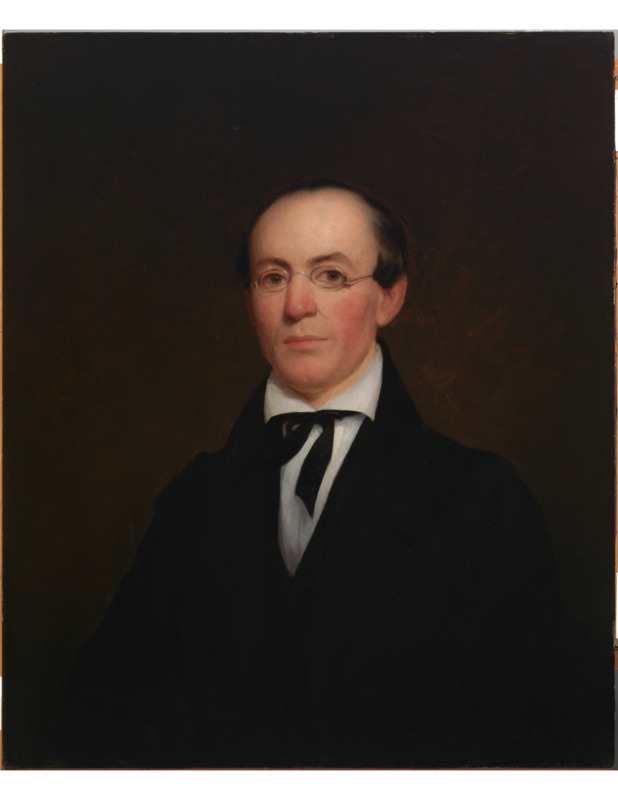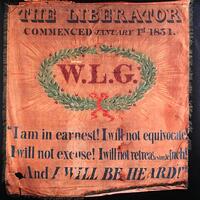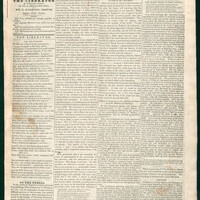William Lloyd Garrison's Interactions with The Appeal

William Lloyd Garrison by Nathaniel Jocelyn
William Lloyd Garrison, portrait by Nathaniel Jocelyn, oil on wood panel
“The south may reasonably be alarmed at the circulation of Mr. Walker’s Appeal; for a better promotion of insurrection was never sent forth to an oppressed people. In a future number we propose to examine it, as also various editorial comments thereon — it being one of the most remarkable productions of the age.”
William Lloyd Garrison, in the first issue of The Liberator
On January 1, 1831, William Lloyd Garrison’s fledgling antislavery newspaper, The Liberator, published an open letter to America’s free blacks, promising to embrace tenets of the immediate, radical abolitionism promoted by black antislavery activists such as David Walker. Historian Donald M. Jacobs noted that to garner the free black community’s support, Garrison strategically aligned his views with many of Walker’s positions in the Appeal,[1] particularly by expressing a firm abandonment of gradualist approaches to ending slavery. In the Liberator’s inaugural issue, Garrison wrote, “In Park-street Church, on the Fourth of July 1829, in an address on slavery, I unreflectingly assented to the popular but pernicious doctrine of gradual abolition. I seize this opportunity to make a full and unequivocal recantation.”[2] Garrison’s engagement with Walker’s call for immediate abolition, and his other interactions with Walker’s ideology, reflected Garrison’s recognition of Walker’s significance to the black community and helped to secure a loyal black readership that financially sustained The Liberator and Garrison for decades.
[1] Donald M. Jacobs, “David Walker and William Lloyd Garrison: Racial Cooperation and the Shaping of Boston Abolition,” in Courage and Conscience: Black & White Abolitionists in Boston, (Bloomington, IN: Published for the Boston Athenaeum by Indiana University Press, 1993), p. 12.
[2] WILLIAM, LLOYD GARRISON. "TO THE PUBLIC." Liberator (1831-1865), 1831, 1, http://mutex.gmu.edu/login?url=https://www-proquest-com.mutex.gmu.edu/magazines/public/docview/91273238/se-2?accountid=14541.
Other positions Garrison shared with Walker, and which brought him closer with Boston’s black leadership, centered on issues of interracial marriage and the inherent inconsistencies between America’s egalitarian ideals and its slavery economy. As part of a larger view of racial equality and integration, efforts to safeguard the lawfulness of interracial marriage received widespread support among both black and white abolitionists. David Walker believed miscegenation laws presented yet another opportunity for whites to dismiss African American entitlement to freedom and equality in the United States.[1] In early issues of The Liberator, Garrison echoed Walker’s opposition to Massachusetts’ 1786 racial intermarriage law, which stipulated, “That no person by this Act authorized to marry, shall join in marriage with any Negro,”[2] and repeatedly argued for its repeal. In an editorial about Walker’s Appeal in The Liberator’s January 8, 1831 issue, Garrison also reiterated Walker’s attack on America’s contradictory liberty rhetoric, writing, “Every Fourth of July celebration must embitter and inflame the minds of the slaves.”[3] Garrison’s decision to address the key points of Walker’s Appeal in the early issues of the Liberator established both Garrison’s comprehension of the Appeal’s political power, and his own commitment toward magnifying the cause of liberty for the American enslaved.
[1] Jacobs, “David Walker and William Lloyd Garrison,” p. 13.
[2] Massachusetts., “1786 Chap. 0003 An Act For The Orderly Solemnization Of Marriages.,” DSpace Home (Boston: Secretary of the Commonwealth, January 1, 1786), https://archives.lib.state.ma.us/handle/2452/104275.
[3] “Africans in America/Part 4/Editorial Regarding ‘Walker’s Appeal,’ PBS (Public Broadcasting Service), accessed July 12, 2021, https://www.pbs.org/wgbh/aia/part4/4h2929t.html.

